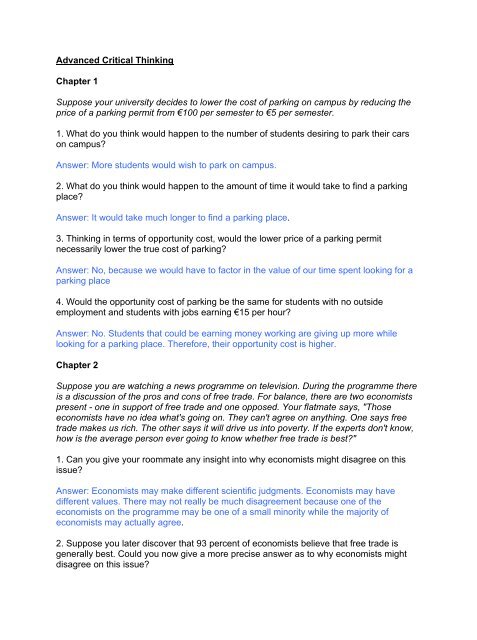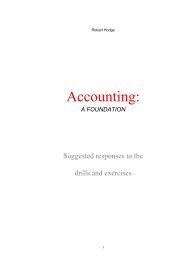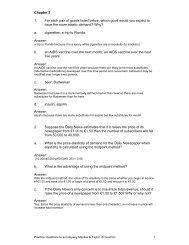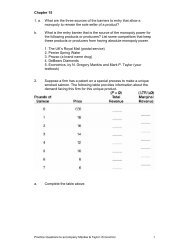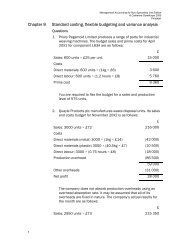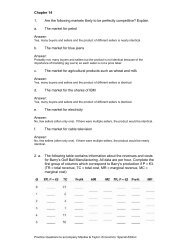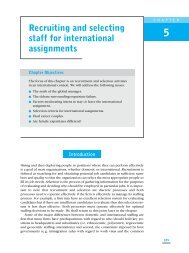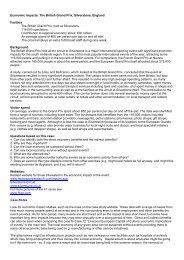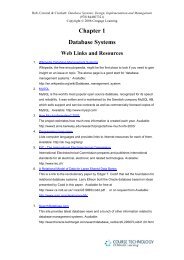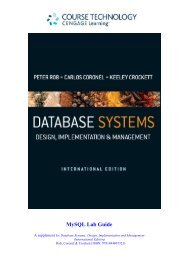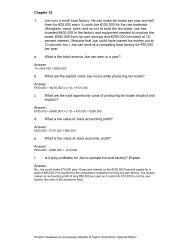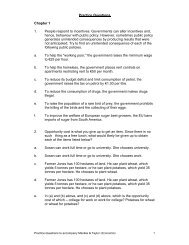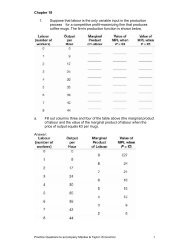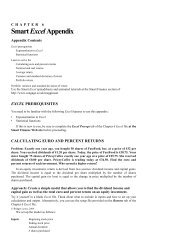Answer - Cengage Learning
Answer - Cengage Learning
Answer - Cengage Learning
You also want an ePaper? Increase the reach of your titles
YUMPU automatically turns print PDFs into web optimized ePapers that Google loves.
Advanced Critical ThinkingChapter 1Suppose your university decides to lower the cost of parking on campus by reducing theprice of a parking permit from €100 per semester to €5 per semester.1. What do you think would happen to the number of students desiring to park their carson campus?<strong>Answer</strong>: More students would wish to park on campus.2. What do you think would happen to the amount of time it would take to find a parkingplace?<strong>Answer</strong>: It would take much longer to find a parking place.3. Thinking in terms of opportunity cost, would the lower price of a parking permitnecessarily lower the true cost of parking?<strong>Answer</strong>: No, because we would have to factor in the value of our time spent looking for aparking place4. Would the opportunity cost of parking be the same for students with no outsideemployment and students with jobs earning €15 per hour?<strong>Answer</strong>: No. Students that could be earning money working are giving up more whilelooking for a parking place. Therefore, their opportunity cost is higher.Chapter 2Suppose you are watching a news programme on television. During the programme thereis a discussion of the pros and cons of free trade. For balance, there are two economistspresent - one in support of free trade and one opposed. Your flatmate says, "Thoseeconomists have no idea what's going on. They can't agree on anything. One says freetrade makes us rich. The other says it will drive us into poverty. If the experts don't know,how is the average person ever going to know whether free trade is best?"1. Can you give your roommate any insight into why economists might disagree on thisissue?<strong>Answer</strong>: Economists may make different scientific judgments. Economists may havedifferent values. There may not really be much disagreement because one of theeconomists on the programme may be one of a small minority while the majority ofeconomists may actually agree.2. Suppose you later discover that 93 percent of economists believe that free trade isgenerally best. Could you now give a more precise answer as to why economists mightdisagree on this issue?
<strong>Answer</strong>: Those opposed to free trade are likely to have different values than the majorityof economists. There is not much disagreement on this issue among the mainstreameconomics profession.3. What if you later discovered that the economist opposed to free trade worked for atrade union. Would that help you explain why there appears to be a difference of opinionon this issue?<strong>Answer</strong>: Yes. It suggests that impediments to international trade may benefit some groups(organized labour) but these impediments are unlikely to benefit the public in general.Supporters of policies to restrict free trade are promoting their own interests.Chapter 3Suppose you are watching a news programme on television. It’s reported that someEuropean politicians have been arguing in favour of quotas to limit imports of textiles intothe EU.1. Is it likely that the EU will be better off if textile imports are limited by quotas? Explain.<strong>Answer</strong>: No. If the EU imports textiles, it is because the opportunity cost of producing themelsewhere is lower than in the EU.2. Will anyone in the EU be better off if textile imports are limited? Explain.<strong>Answer</strong>: Yes. Those associated with the domestic textile industry — shareholders ofdomestic textile producers and textile workers.3. In the real world, does every person in a country gain when restrictions on imports arereduced? Explain.<strong>Answer</strong>: No. When we reduce restrictions on imports, the country gains from theincreased trade but individuals in the affected domestic industry may lose.Chapter 4Suppose you are chatting to a friend in Brazil on the internet. Your friend tells you that theweather is forecast to be really cold in the next few weeks and the frost that’s expectedwill damage the coffee crop. Your friend says, "If there are going to be fewer coffee beansavailable, I'll bet that coffee bean prices will rise. We should buy enormous quantities ofcoffee beans now and put them in storage. Later we will sell them and make a hugeprofit."1. If this information about the weather is publicly available so that all buyers and sellers inthe coffee bean market expect the price of coffee beans to rise in the future, what willhappen immediately to the supply and demand for coffee beans and the equilibrium priceand quantity of apples?
<strong>Answer</strong>: Sellers reduce supply (supply shifts left) in the hope of selling coffee beans laterat a higher price and buyers increase demand (demand shifts right) in the hope of buyingcoffee beans now before the price goes up. The price will immediately rise and the effecton the quantity exchanged is ambiguous.2. Can you "beat the market" with public information? That is, can you use publiclyavailable information to help you buy something cheap and quickly sell it at a higher price?Why or why not?<strong>Answer</strong>: No. Usually the market immediately adjusts so that the price has already movedto its new equilibrium value before the amateur speculator can make his or her purchase.3. Suppose the expected frost in Brazil is not reported outside of Brazil. Can you "beat themarket" with inside information? Why?<strong>Answer</strong>: Yes. In this case, you can make your purchase before the market responds fullyto the information about the weather. Coffee bean prices will probably rise somewhatstraight away, as those with access to the information respond, but they will rise furtherwhen the information becomes known to all market participants.Chapter 5In order to reduce smoking, the government places an additional tax of £2 per pack oncigarettes. After one month, while the price to the consumer has increased a great deal,the quantity demanded of cigarettes has been reduced only slightly.1. Is the demand for cigarettes over the period of one month price elastic or priceinelastic?<strong>Answer</strong>: Inelastic.2. Suppose you are in charge of pricing for a tobacco firm. The chief executive of your firmsuggests that the evidence received over the last month demonstrates that the cigaretteindustry should get together and raise the price of cigarettes further because total revenueto the tobacco industry will certainly rise. Is the president of your firm correct? Why?<strong>Answer</strong>: Not necessarily. Demand tends to be more price elastic over longer periods. Inthe case of cigarettes, some consumers would substitute toward cigars and pipes. Otherswould smoke less or give up smoking altogether. And some people who would havestarted to smoke in the future would not do so.3. As an alternative, suppose the chief executive of your tobacco firm suggests that yourfirm should raise the price of your cigarettes independent of the other tobacco firmsbecause the evidence clearly shows that smokers are insensitive to changes in the priceof cigarettes. Is the president of your firm correct if it is his/her desire to maximize totalrevenue? Why?
<strong>Answer</strong>: No. While the demand for cigarettes (the market broadly defined) may beinelastic, the demand for any one brand (market narrowly defined) is likely to be muchmore elastic because consumers can substitute toward other lower priced brands.Chapter 6Suppose that the government needs to raise tax revenue. A politician suggests that thegovernment place a tax on food because everyone must eat and, thus, a food tax wouldsurely raise a great deal of tax revenue. However, since the poor spend a large proportionof their income on food, the tax should be collected only from the sellers of food (grocerystores) and not from the buyers of food. The politician argues that this type of tax wouldplace the burden of the tax on corporate grocery store chains and not on poor consumers.1. Can the government legislate that the burden of a food tax will fall only on the sellers offood? Why or why not?<strong>Answer</strong>: No. The tax burden is determined by the price elasticities of supply and demand.The burden of a tax falls most heavily on the side of the market that is less price elastic.That is, the burden is on the side of the market least willing to leave the market when theprice moves unfavourably.2. Do you think the burden of a food tax will tend to fall on the sellers of food or the buyersof food? Why?<strong>Answer</strong>: The burden will fall most heavily on the buyers of food regardless of whether thetax is collected from the buyers or the sellers. Food is a necessity and therefore thedemand for food is relatively inelastic. When the price rises due to the tax, people stillmust eat. Grocery chains can sell another product line when the price they receive forfood falls due to the tax.Chapter 7Suppose you are having an argument with your flatmate about whether the EU shouldsubsidize the production of food. Your roommate argues that since food is something thatis unambiguously good (unlike alcohol and tobacco) we simply cannot have too much of it.That is, since food is clearly good, having more of it must always improve our economicwell-being.1. Is it true that you cannot have too much of a good thing? Conversely, is it possible tooverproduce unambiguously good things such as food, clothing, and shelter? Why?<strong>Answer</strong>: You can have too much of a good thing. Yes, any good with a positive cost and adeclining willingness to pay from the consumer can be overproduced. This is because atsome point of production, the cost per unit will exceed the value to the buyer and there willbe a loss to total surplus associated with additional production.
2. In Exhibit 5, demonstrate your answer to question (1) above with a supply and demandgraph for food by showing the impact on economic well-being of producing quantities inexcess of the equilibrium quantity.Exhibit 5<strong>Answer</strong>:Chapter 8Suppose you live in a country whose government has a budget deficit of €100 million.Since the government currently collects exactly €100 million from its 5 percent sales tax,your flatmate says, "I can tell them how to fix their deficit. They should simply double thesales tax to 10 percent. That will double their tax revenue from €100 million to €200 millionand provide the needed €100 million."1. Is it true that doubling a tax will always double tax revenue? Why?<strong>Answer</strong>: No. Usually an increase in a tax will reduce the size of the market because thetax will increase the price to buyers causing them to reduce their quantity demanded anddecrease the price to sellers causing them to reduce their quantity supplied. Therefore,when taxes double, the government collects twice as much per unit on many fewer unitsso tax revenue will increase by less than double and tax revenue could, in some extremecases, even go down.2. Will doubling the sales tax affect the tax revenue and the deadweight loss in all marketsto the same degree? Explain?<strong>Answer</strong>: No. Some markets may have extremely elastic supply and demand curves. Inthese markets, an increase in a tax causes market participants to leave the market andlittle revenue is generated from the tax increase but deadweight loss increases a greatdeal. Other markets may have inelastic supply and demand curves. In these markets, an
increase in a tax fails to cause market participants to leave the market and a great deal ofadditional tax revenue is generated with little increase in deadweight loss.Chapter 9You are watching the nightly news during an election campaign in which trade policy hasbeen a big issue. A member of the public being interviewed says, "I'm for free trade, but itmust be fair trade. If our foreign competitors will not raise their environmental regulations,reduce subsidies to their export industries, and lower tariffs on their imports of our goods,we should retaliate with tariffs and import quotas on their goods to show them that wewon't be played for fools!"1. If a foreign country artificially lowers the cost of production for its producers with laxenvironmental regulations and direct subsidies and then exports the products to us, whogains and who loses in our country, producers or consumers?<strong>Answer</strong>: Consumers gain, producers lose.2. Continuing from question 1 above, does our country gain or lose? Why?<strong>Answer</strong>: Our country gains because the gains of the consumers exceed the losses of theproducers.3. If a foreign country subsidizes the production of a good exported to our country, whobears the burden of their mistaken policy?<strong>Answer</strong>: The taxpayers of the foreign country.4. What happens to our overall economic well-being if we restrict trade with a country thatsubsidizes its export industries? Explain.<strong>Answer</strong>: Producers gain, consumers lose, but consumers lose more than producers gainso total surplus is reduced and there is a deadweight loss. The result is no different thanrestricting trade when the foreign producer has no unfair advantage.5. Is there any difference in the analysis of our importation of a good sold at the cost ofproduction or sold at a subsidized price? Why?<strong>Answer</strong>: No. In either case, the world price is lower than the before-trade domestic price,causing consumers to gain and producers to lose from trade. Also, restrictions on tradecause consumers to lose more than producers gain whether the production of the goodwas subsidized or not.6. Is it a good policy to threaten trade restrictions in the hope that foreign governments willreduce their trade restrictions? Explain.<strong>Answer</strong>: Usually not. If the other country fails to give in to the threat, the threateningcountry has to choose between backing down and reducing trade—neither of which isdesirable.
Chapter 10Suppose you are at home for a semester break. A letter in your local newspaper catchesyour attention. The letter is about a deduction in local property tax that can be claimed bya property owner if he or she has done anything to beautify his/her property. The propertyowner can deduct 50 per cent of any expenditure on things such as landscaping fromhis/her property taxes. For example, if your parents spent €2000 on landscaping theirgarden, they can reduce their tax bill by 0.50 x €2000 = €1000 so that the effective cost ofthe landscaping would be only €1000. The letter in the newspaper claims: "This anoutrage. If someone wants to improve their house, it is no one's business but their own. Iremember some of my college economics and I know that taxes and subsidies are alwaysinefficient."1. What is the local government trying to subsidize with this tax break?<strong>Answer</strong>: Expenditures on home improvement.2. What is the externality that this subsidy is trying to internalize?<strong>Answer</strong>: When a house is well maintained, it raises the value (or fails to reduce the value)of the nearby property. Individual buyers and sellers in the market for home repair do nottake this into account when choosing the quantity of home repair and, thus, the optimalquantity exceeds the equilibrium quantity.3. While taxes and subsidies usually create inefficiencies, are taxes and subsidies alwaysinefficient? Why?<strong>Answer</strong>: No. Appropriate Pigovian taxes and subsidies move a market closer to efficiencybecause the market equilibrium is inefficient to begin with.Chapter 11Broadcast television and broadcast radio send out signals that can be received by aninfinite number of receivers without reducing the quality of the reception of otherconsumers of the signal and it is not possible to charge any of the consumers of thesignal.1. What type of good (private, public, common resource, produced by a natural monopoly)is a broadcast television or broadcast radio signal? Explain.<strong>Answer</strong>: Public good. A broadcast signal is not rival and not excludable.2. Are goods of this type normally provided by private industry? Why?<strong>Answer</strong>: No, because it is not profitable to produce a good for which non-payers cannot beexcluded from consuming it.
3. Private companies have been providing broadcast radio television and radio since theinvention of the medium. How do they make it profitable if they cannot charge the recipientof the signal?<strong>Answer</strong>: Broadcasters charge advertisers for the commercials they show during thebroadcasters’ programming. That is why it is called commercial television or commercialradio.4. What are the "recent" alternatives to traditional commercial television and commercialradio?<strong>Answer</strong>: Cable television, pay-per-view television, and cable music included with cabletelevision.Chapter 12You are having a political debate with a friend. The discussion centres on taxation. Youshow your friend some data from your economics textbook that suggests that the averagecitizen paid about €10,000 in tax in 2005. Your friend says, "If €10,000 per person is whatit takes to run this country, then I think that it would be much simpler if we just billed eachcitizen €10,000 and eliminated the complex tax system."1. What type of tax is your friend suggesting? What is its appeal?<strong>Answer</strong>: Lump-sum tax. It is the most efficient tax—its marginal rate is zero so it does notdistort incentives, and it imposes the minimum administrative burden.2. Is this type of tax supported by the "benefits principle" of tax equity? Explain.<strong>Answer</strong>: No, if some people benefit more from public services such as health care, policeand education, they should pay more in taxes, and those who benefit less should pay less.3. Is this type of tax supported by the "ability-to-pay" principle of tax equity? Is it verticallyequitable? Is it horizontally equitable?<strong>Answer</strong>: No, wealthy people have a greater ability to pay. Therefore, it is not verticallyequitable. However, it is horizontally equitable in that people with the same ability to payare paying the same amount because all pay the same amount.4. Since your friend agrees that the tax she suggested is not equitable, she now suggeststhat we simply tax rich corporations since they can clearly afford it and then peoplewouldn't have to pay any taxes. Is she correct? Who would actually pay the taxes? Explainhow she mistakenly employed the flypaper theory of taxation.<strong>Answer</strong>: No, only people pay taxes—corporations collect taxes. The taxes are paid by theowners, workers, and customers of the corporations. The flypaper theory of taxationmistakenly says that burden of a tax is on the person or company from whom the taxesare collected.Chapter 13
incurred from staying open for the additional hours (electricity, wages of night shiftworkers, etc).2. Are the costs of rent, equipment, fixtures, salaries of management, and so on, relevantwhen the supermarket makes the decision whether to stay open at night? Why?<strong>Answer</strong>: No. These costs are fixed costs or sunk costs — costs that cannot be recoveredeven if the supermarket chooses not to operate at night.3. If the supermarket had the same number of customers during its daytime hours as youobserved during its nighttime hours, do you think it would continue to operate? Explain.<strong>Answer</strong>: It is unlikely. This is because the temporary shut-down decision (staying openadditional hours at night) depends on whether total revenue equals or exceeds variablecosts, but the decision to remain in the market in the long-run depends on whether totalrevenue equals or exceeds total costs. It is unlikely that the revenue earned at nightcovers total costs (both fixed and variable costs).Chapter 15Suppose you are watching a television business programme. A consumer advocate isdiscussing the airline industry. He says, "There are so many rates offered by airlines that itis technically possible for a 747 to be carrying a full load of passengers where no two ofthem paid the same price for their tickets. This is clearly unfair and inefficient." Hecontinues, "In addition, the profits of the airlines have doubled in the last few years sincethey began this practice and these additional profits are clearly a social burden. We needlegislation that requires airlines to charge all passengers on an airplane the same price fortheir travel."1. List some of the ways airlines divide their customers according to their willingness topay.<strong>Answer</strong>: Airlines segment people by age (young and old fly cheaper), by location (morecompetitive routes are cheaper), by length of time between leaving and returning (touristsfly cheaper than business travelers), by length of time of advance booking (later bookingscan be more expensive until the very last minute when it may become cheaper again) andso on.2. Is it necessarily inefficient for airlines to charge different prices to different customers?Why?<strong>Answer</strong>: No. Price discrimination can improve efficiency. By charging buyers theirwillingness to pay, the monopolist increases production to the point where all units areproduced where the value to buyers is greater than or equal to the cost of production.3. Is the increase in profits generated by this type of price discrimination a social cost?Explain.
<strong>Answer</strong>: No. Some of the additional profits are from the creation of additional surplus thataccrues entirely to the producer and some of the profits are a redistribution of surplus fromconsumer surplus to producer surplus.Chapter 16Suppose you are reading your local newspaper. An advertisement says in large letters:"Come on down to Warehouse Electronics. We've got deals so great you won't believe it!National brand 13-inch colour television sets for €99. The price is so low that we can't tellyou the name of the manufacturer!"1. Why would Warehouse Electronics be unable to reveal the name of the manufacturerwhen it advertises its television sets for an unusually low price?<strong>Answer</strong>: The manufacturer may be engaging in "resale price maintenance" or "fair trade"practices with its retailers (including Warehouse Electronics). This may restrict theretailer’s right to advertise a price below the suggested retail price for the product.2. Although this activity appears like price fixing, is the objective of this practice to reducecompetition? Why?<strong>Answer</strong>: No, because any reduction in competition at the retail level generates marketpower for the retailer and fewer units will be sold. This is not in the interest of themanufacturer.3. Why would the manufacturer place this type of restriction on the retailers that sell itsproducts?<strong>Answer</strong>: The purpose is to stop discount retailers from free riding on the services providedby full service retailers—retailers with a knowledgeable sales force, a repair shop, and soon.Chapter 17Suppose you are watching a sporting event on television. An advertisement featuringTiger Woods (a famous golfer) is broadcast during a commercial break. In theadvertisement, Tiger Woods does nothing but hit golf balls. He never speaks. There is nowritten copy. At the end of the advertisement, the Nike "swoosh" appears on the screenalong with the words "Nike Golf." A short time earlier, you read in a newspaper that TigerWoods received $40 million to be the spokesperson for Nike golf equipment.1. A friend watches the Nike advertisement with you and says, "What a waste of society'sresources. I didn't learn anything about Nike golf equipment from that ad. I think thereshould be government regulations requiring ads to be informative in some way." Explain toyour friend what you did learn from Tiger Wood's presence in this advertisement.<strong>Answer</strong>: Viewers learned that Nike was willing to spend an enormous amount of money topromote their new line of golf equipment. This signals that their market research suggeststhat they have a high quality product that will generate repeat sales.
2. Did the use of the Nike name and Nike "swoosh" provide any information? Explain.<strong>Answer</strong>: Yes. The use of the brand name provides information that the product is of highquality and that the firm has incentive to maintain high quality. Nike is a multibillion-dollarcompany that would not want to risk losing existing sales of shoes and athletic ware bymarketing poor quality golf equipment marked with the Nike brand name.3. In general, does advertising tend to decrease competition and raise prices toconsumers or increase competition and reduce prices to consumers? Why?<strong>Answer</strong>: Advertising tends to increase competition and decrease prices to consumersbecause it often provides information about prices, the existence of new products, thelocation of retail outlets, and it provides new firms with the means to attract customersfrom existing firms.Chapter 18Suppose you are watching a debate about immigration on television with a friend. Theparticipants represent two camps – trade unions and corporate industry. The trade unionrepresentative argues against increased immigration while the industry representativeargues in favour. Your friend says, "I can't believe that these two groups can't get togetheron this issue. Both firms and workers join forces to produce our industrial output. I wouldthink that their interests would be similar. Maybe a better arbitrator could help thesegroups find a position on immigration that would satisfy both groups."1. If there were increased immigration, what would happen to the value of the marginalproduct of labour and the wage?<strong>Answer</strong>: Labour would become less scarce so the value of the marginal product of labourwould decrease and so would the wage.2. If there were open immigration, what would happen to the value of the marginal productof capital and land and their rental rates?<strong>Answer</strong>: Additional labour could be applied to capital and land, which would increase thevalue of the marginal product of capital and land and increase their rental rates.3. Are the positions that each group takes on immigration consistent with their interests?Explain. Is there likely to be a solution that satisfies both?<strong>Answer</strong>: Yes. The workers’ side wishes to keep the wage of labour high so it hopes torestrict immigration. Corporate interests wish to raise the return to capital and land so ithopes to allow open immigration. No, there is no solution that is likely to satisfy both sides.Chapter 19Suppose you are at a political rally. A speaker states that working women earn about 60cents for each euro that working men earn. The speaker says, "This is clearly evidence ofemployers’ discrimination against women. This gap between the earnings of men andwomen will never close because the professions women tend to choose are traditionally
low paying and the professions men choose are traditionally high paying. I demand thatthe government create a panel to decide what jobs should pay so that people of similarskills and education earn the same amount."1. Suppose a secretary and a truck driver are judged to require the same level ofeducation and skills, yet a secretary earns €30,000 while a truck driver earns €40,000.What would happen to the quantities supplied and demanded in the market for secretariesand truck drivers if the wage for these professions were set by law at €35,000?<strong>Answer</strong>: There will be a surplus of secretaries and a shortage of truck drivers. That is, itwill increase the quantity supplied of secretaries and decrease the quantity demandedwhile it will decrease the quantity supplied of truck drivers and increase the quantitydemanded.2. What would happen to the level of effort and natural ability of the workers available ineach market? What would happen to the quality of work generated in each market?<strong>Answer</strong>: Hardworking, high-ability workers would avoid the truck driving market and thequality of truck driving would be reduced. Hardworking and high-ability workers would beattracted to the secretary market and the quality of secretarial services would beincreased.3. Suppose it is true that the skills and education required to do each job are, in fact,nearly identical. What explanation would an economist likely propose to explain why theequilibrium wage differs by €10,000 across these markets?<strong>Answer</strong>: An economist would argue that €10,000 is the compensating differentialnecessary to get someone to undertake the disagreeable nature of truck driving —working alone, overnight travel away from home, less clean and less safe workenvironment, etc.Chapter 20Suppose a friend comments to you, "I think welfare recipients are simply lazy spendthrifts.I have a friend who receives Temporary Benefit for Needy Families and when she wasoffered a part-time job, she turned it down."1. What tends to happen to a benefit recipient's benefits if they increase their earnings?<strong>Answer</strong>: They tend to lose benefits at a very high rate.2. What is the effective tax rate on their additional income if they were to lose €1 inbenefits for each euro of additional income?<strong>Answer</strong>: The tax rate would be 100 per cent on the additional income, and could be morethan this if they also pay income tax on the additional income.3. How does this system affect a benefit recipient's incentive to work? Is a benefit recipientnecessarily lazy if they turn down a part-time job?
<strong>Answer</strong>: Once one is on benefit, there may be little or no incentive to work. Once onbenefit, a person need not be lazy to remain on it. It may be rational to remain on benefit ifevery time a person makes a euro, the person loses a euro in benefits.Chapter 21Suppose Marc and Nathalie both buy only two goods: food and wine. Consider whathappens to their purchasing behaviour when the price of food falls.1. It is observed that if the price of food falls, then Marc buys more food and more wine?Explain why this happens.<strong>Answer</strong>: If the price of food falls then food becomes cheaper relative to wine and Marc willsubstitute additional food for some of the wine he was previously buying. But the fall in theprice of food increases Marc’s real income. (The purchasing power of the Marc’s incomeis increased.) So Marc is buying more wine because his income has increased; and thisincrease due to the income effect is larger than the reduction in his wine purchases due tothe substitution effect.2. It is observed that if the price of food falls, then Nathalie buys more wine but less food?Explain why this happens.<strong>Answer</strong>: If the price of food falls then food becomes cheaper relative to wine and Nathaliewill substitute additional food for some of the wine she was previously buying. But the fallin the price of food increases Nathalie’s real income. For some goods, some consumersmay buy less when their incomes rise. Such goods are called inferior goods. So forNathalie, food is an inferior good. In fact, because the reduction in her food purchases dueto the income effect is larger than the increase due to the substitution effect, we can saythat food is a Giffen good for Nathalie. Wine, however, is a normal good – Nathalie buysmore of it when her income rises.Chapter 22When you buy motor insurance the policy will generally stipulate that the policyholder isresponsible for the first part of any claim; for example, you might have to pay the first €250or €1,000 of any claim and the insurance company would pay the rest. The amount youwould have to pay is called the deductible.1. How does this arrangement help to deal with the problem of moral hazard?<strong>Answer</strong>: The problem of moral hazard in this case is that without the deductiblepolicyholders might be less careful to lock their cars when leaving them unattended, andmight engage in other risky behaviour, knowing that if their car is stolen or damaged thenthe insurer will pay all the consequent costs. They would not do this if they weren’tinsured. By forcing policyholders to pay some of the costs of a claim, this behaviour isdiscouraged.2. How does this arrangement help to deal with the problem of adverse selection?
<strong>Answer</strong>: The problem of adverse selection is that motorists have more information abouttheir driving abilities and habits than do insurance companies, making it difficult for theinsurers to identify high and low risk drivers and charge them appropriate premiums.Stipulating a high deductible on lower premium policies and a lower deductible on higherpremium policies will tend to encourage higher risk drivers to buy the higher premiumpolicies. Lower risk drivers will buy the cheaper policies. So the insurance companies areable to separate high and low risk drivers and overcome the problem of adverse selection.Chapter 23Suppose you are watching a news report with a friend. The news report points out that acertain African nation generates a GDP per capita of only $1,300 per year. Since yourfriend knows that UK GDP per capita is approximately $26,000, he suggests that Britonsare materially 20 times better off than the people of the African nation.1. Is your friend’s statement accurate?<strong>Answer</strong>: No.2. What general category of production is not captured by GDP in both the UnitedKingdom and the African nation?<strong>Answer</strong>: Non-market activities such as household production.3. Provide some examples of this type of activity.<strong>Answer</strong>: Household production done by an individual without pay such as gardening,cleaning, sewing, home improvement or construction, child supervision, etc.4. Why would the exclusion of this type of production affect the measurement of Africanoutput more than UK output?<strong>Answer</strong>: A greater proportion of the output produced by developing nations is non-marketoutput. That is, it is not sold and recorded as a market transaction.5. Does this mean that residents of the African nation are actually as well off materially asresidents in the United Kingdom?<strong>Answer</strong>: No. It just means that quantitative comparisons between nations of greatlydifferent levels of development are very difficult to do and are often inaccurate.Chapter 24Suppose you’ve been talking to a friend’s father who told you that he gave up smokingcigarettes in 1995. When you asked him why he quit, you got a surprising answer. Insteadof reciting the health benefits of quitting smoking, he said, "I quit because it was justgetting too expensive. I started smoking in 1965 and cigarettes were only 45 cents a pack.The last pack I bought was €2.00 and I just couldn't justify spending more than four timesas much on cigarettes as I used to."
1. In 1965, the CPI was 31.5. In 1995 the CPI was 152.4. While it is commendable thatyour friend’s father quit smoking, what is wrong with his explanation?<strong>Answer</strong>: He is only looking at the cost of cigarettes uncorrected for inflation. It is likely thatthe real cost has not risen as much as first appears and it may even have gone down.2. What is the equivalent cost of a 1965 pack of cigarettes measured in 1995 prices?<strong>Answer</strong>: €0.45 x (152.4/31.5) = €2.18 which is greater than €2.00, so cigarettes werecheaper in 1995 than in 1965 in real terms.3. What is the equivalent cost of a 1995 pack of cigarettes measured in 1965 prices?<strong>Answer</strong>: €2.00 x (31.5/152.4) = €0.41 which is less than €0.454. Do both methods give you the same conclusion?<strong>Answer</strong>: Yes, each method suggests that, after correcting for inflation, cigarettes wereactually more expensive in 1965.5. The preceding example demonstrates what economists refer to as "money illusion."Why do you think economists might choose the phrase "money illusion" to describe thisbehaviour?<strong>Answer</strong>: When people base decisions on values uncorrected for inflation, there may be anillusion that the cost of living has risen.Chapter 25You are having a discussion with some friends. The conversation turns to a supposed lackof growth and opportunity in the Europe when compared to some Asian countries such asJapan, South Korea, Taiwan, and Singapore. One of your friends says, "These Asiancountries must have cheated somehow. That's the only way they could have possiblygrown so quickly."1. Have you learned anything in this chapter that would make you question your friend’sassertion?<strong>Answer</strong>: Yes. There are many sources of growth and a country can influence all of themexcept natural resources.2. The phenomenal growth rate of Japan since World War II has often been referred to asthe "Japanese miracle." Is it a miracle or is it explainable?<strong>Answer</strong>: Japan’s growth is explainable. Indeed, all of the high growth Asian countries haveextremely high investment as a percent of GDP.3. Are the high growth rates found in these Asian countries without cost?
<strong>Answer</strong>: No. The opportunity cost of investment is that someone must forgo currentconsumption in order to save and invest.Chapter 26Suppose you are listening to an opposition party spokesperson being interviewed on radioduring an election campaign. When questioned about their position on economic growth,the spokesperson says, "We need to get this country growing again. We need to use taxincentives to stimulate saving and investment, and we need to get the budget deficit downso that the government stops absorbing our nation's savings."1. If the opposition party’s spending plans remain unchanged from current governmentspending, what inconsistency is implied by the spokesperson's statement?<strong>Answer</strong>: Tax incentives to stimulate saving and investment require a reduction in taxes.This would increase the deficit, which would reduce national saving and investment.2. If the opposition party truly wishes to decrease taxes and decrease the budget deficit,what has the spokesperson implied about his party’s plans for government spending?<strong>Answer</strong>: The candidate plans to reduce government spending.3. If policy makers want to increase growth, and if policy makers have to choose betweentax incentives to stimulate saving and tax incentives to stimulate investment, what mightthey want to know about supply and demand in the loanable funds market before makingtheir decision? Explain.<strong>Answer</strong>: Policymakers would want to know the elasticity (similar to the steepness) of thesupply and demand curves. If loanable funds demand is inelastic, changes in loanablefunds supply have little effect on saving and investment, so tax incentives to increasesaving at each interest rate do little for growth. If loanable funds supply is inelastic,changes in loanable funds demand have little effect on saving and investment, so taxincentives to increase investment at each interest rate do little for growth.Chapter 27Suppose you are about to graduate with a first class degree in economics. Yourboy/girlfriend’s parents are visiting. When they arrive they find you throwing darts at theshare price pages of the Financial Times, which you have pinned to your notice board onthe wall. You inform them that you received a generous signing-on bonus from thecompany for which you agreed to work after graduation. You are now in the process ofpicking the shares in which you plan to invest. Your visitors are horrified. Yourboy/girlfriend’s father says, "There's got to be a better way to choose shares. I can giveyou the phone number of my stockbroker, or you could at least buy a well-known, wellmanagedunit trust or investment fund."1. What is the stock valuation method to which your father is referring, and what is itsgoal?
<strong>Answer</strong>: Fundamental analysis. This is the detailed analysis of a firm’s accountingstatements and future prospects to determine its value. The goal is to choose shares thatare undervalued — those whose share prices are less than their values.2. Explain the efficient markets hypothesis to your visitors. If the efficient marketshypothesis is true, can your boy/girlfriend’s father's method for picking stocks achieve itsgoal?<strong>Answer</strong>: The efficient markets hypothesis argues that the stock market is informationallyefficient in that it reflects all available information about the value of the traded shares.That is, market participants monitor news that affects the value of a share. Since at anygiven time the number of buyers of a share equals the number of sellers, an equal numberof people think a share is undervalued as overvalued. Thus, stock is fairly valued all thetime and its price should follow a random walk. If true, it is not possible to consistently buyundervalued shares.3. If the efficient markets hypothesis is true, what is the only goal of your dart throwingexercise? Explain.<strong>Answer</strong>: The only thing a person can do is diversify their portfolio to reduce idiosyncraticrisk.4. If the efficient markets hypothesis is true, which will likely provide the greater return inthe long run: your dart throwing exercise or an actively managed mutual fund? Why?<strong>Answer</strong>: If you throw enough darts to remove most of the idiosyncratic risk (your portfoliostarts to resemble the entire market like an index fund) and if you bought and held theshares (you didn’t trade often), then it is likely that throwing darts would give you thegreater return. This is because active managers of investment funds tend to tradefrequently, incurring trading costs, and they charge fees for their supposed expertise, yetthey cannot reduce aggregate risk.Chapter 28Suppose you are watching the national news with your flatmate. The newsreader says,"Official unemployment statistics released today show an increase in unemployment from6.1 percent to 6.2 percent. This is the third month in a row where the unemployment ratehas increased." Your flatmate says, "Every month there are fewer and fewer people withjobs. I don't know how much longer the country can continue like this."1. Can your roommate's statement be deduced from the unemployment rate statistic?Why?<strong>Answer</strong>: No. The unemployment rate is the ratio of the number of unemployed to the totallabour force. If the labour force grows (new graduates, housewives and househusbandsentering the labour force, etc) and if few of the new members of the labour force find work,then the unemployment rate will rise but the number of employed could stay the same orrise.
2. What information would you need to determine whether there are really fewer peoplewith jobs?<strong>Answer</strong>: The number of people employed is a component of the labour force and you canget information on that number directly.Chapter 29Suppose you are a personal friend of the governor of the UK central bank, the Bank ofEngland. He comes over to your house for lunch and notices your sofa. The governor isso struck by the beauty and comfort of your sofa that he says he simply must have it forhis office. The governor buys it from you for £1,000 and, since it is for his office, pays youwith a cheque drawn on the Bank of England.1. Are there more pounds in the economy than before? Why?<strong>Answer</strong>: Yes. When the Bank of England purchases anything, and pays with a chequedrawn on itself, it pays with newly created pounds, so there are more pounds in theeconomy.2. Why do you suppose that the Bank of England doesn't buy and sell sofas, cars, and soon, instead of government bonds when it wishes to change the money supply?<strong>Answer</strong>: The transactions costs and storage costs would be staggering. Also, the value ofthe inventory of "items" would never be certain. The open market for government bonds ismuch more efficient.3. If the Bank of England doesn't want the money supply to rise when it purchases newfurniture, what might it do to offset the purchase?<strong>Answer</strong>: The central bank could sell government bonds of equal value to offset otherpurchases.Chapter 30Suppose you explain the concept of an "inflation tax" to a friend. You correctly tell them,"When a government prints money to cover its expenditures instead of taxing orborrowing, it causes inflation. An inflation tax is simply the erosion of the value of moneyfrom this inflation. Therefore, the burden of the tax lands on those who hold money." Yourfriend responds, "What's so bad about that? Rich people have all the money so aninflation tax seems fair to me. Maybe the government should finance all of its expendituresby printing money."1. Is it true that rich people hold more money than poor people?<strong>Answer</strong>: Yes, rich people probably hold more money than poor people.2. Do rich people hold a higher percent of their income as money than poor people?
<strong>Answer</strong>: No, by a wide margin, poor hold a larger percent of their income as money. Infact, the poor may have no other financial asset at all.3. Compared to an income tax, does an inflation tax place a greater or lesser burden onthe poor?<strong>Answer</strong>: An inflation tax places a far greater burden on the poor than on the rich. The richare able to keep most of their assets in inflation-adjusted, interest-bearing assets. Weobserved this in Brazil and Argentina during periods of high inflation.4. Are there any other reasons why engaging in an inflation tax is not good policy?<strong>Answer</strong>: Inflation imposes many other costs on the economy besides the inflation tax:shoeleather costs, menu costs, tax distortions, confusion, etc.Chapter 31Suppose you are having breakfast with your parents one Sunday. Your father is readingthe paper and comments on a report that the exchange rate for the pound has just hit itslowest value in a decade. He reads on and then exclaims that JCB, a heavy equipmentmanufacturer, has reported that sales of their earth moving equipment have hit an all timehigh. Your parents are shocked by the report's positive view of the low value of the pound.They’ve recently abandoned plans to visit Australia because of the pound’s low value.1. Why might JCB and your parents have different opinions about the value of the dollar?<strong>Answer</strong>: JCB sells much of its equipment to foreigners and the low value of the poundmakes JCB’s products cheaper to foreigners. Your parents were going to buy foreigngoods and services and the cost in pounds became higher.2. JCB imports many parts and raw materials for their manufacturing processes and theysell many finished products abroad. If they are happy about a low pound, what must betrue about the ratio of JCB’s imports and exports?<strong>Answer</strong>: JCB must sell a greater value of products abroad than they purchase. That is, thecompany is a net exporter.3. If someone argues that a strong pound is "good for the UK" because UK residents areable to exchange some of their GDP for a greater amount of foreign GDP, is it true that astrong pound is good for every UK resident? Why?<strong>Answer</strong>: No. A strong dollar benefits UK residents who are net importers and harms Kresidents who are net exporters.Chapter 32Hong Kong has a capitalistic economic system. It was leased from China by Great Britainfor 100 years. In 1997, it was returned to China, a socialist republic.
1. What do you think this event might have done to the net capital outflow of Hong Kong?Why?<strong>Answer</strong>: It might have increased the NCO of Hong Kong because of capital flight.Investors in Hong Kong, fearing that China may nationalize much of Hong Kong’s industry,would buy assets abroad; and foreign investors would not wish to buy assets in HongKong.2. If the residents of Hong Kong chose Canada as a place to move some of their businessactivity, what impact do you suppose this will have on the value of the Canadian interestrate and exchange rate? Why?<strong>Answer</strong>: This will decrease Canada’s NCO. This shifts the demand for loanable funds leftand lowers the real interest rate. The reduced NCO reduces the supply of Canadiandollars in the foreign-currency exchange market, raises the exchange rate, and moves NXtoward deficit.3. Which Canadian industries, those engaged in importing or exporting, are likely to bepleased with Hong Kong's investment in Canada? Why?<strong>Answer</strong>: The increase in the value of the Canadian dollar will make Canadian producersless competitive abroad, but will make imports cheaper.4. What impact will Hong Kong's return to China have on the growth rate of Canada?<strong>Answer</strong>: The reduction in Canada’s NCO (due to Hong Kong’s increased NCO) increasesthe capital stock of Canada, causing it to grow.Chapter 33Suppose you are watching the evening news on television. The newsreader reports thatunion wage demands are much higher this year because the workers anticipate anincrease in the rate of inflation. Your flatmate says, "Inflation is a self-fulfilling prophecy. Ifworkers think there are going to be higher prices, they demand higher wages. Thisincreases the cost of production and firms raise their prices. Expecting higher pricessimply causes higher prices."1. Is this true in the short run? Explain.<strong>Answer</strong>: Yes. An increase in price expectations shifts the short-run aggregate supplycurve to the left and prices rise.2. If policymakers do nothing and allow the economy to adjust to the natural rate of outputon its own, does expecting higher prices cause higher prices in the long run? Explain.<strong>Answer</strong>: No. In the long run, the increase in unemployment will cause wages and priceexpectations to fall back to their prior levels.3. If policymakers accommodate the adverse supply shock, does the expectation of higherprices cause higher prices in the long run? Explain.
<strong>Answer</strong>: Yes. If policymakers accommodate the adverse supply shock with an increase inaggregate demand, the price level will rise permanently.Chapter 34Suppose you are watching the news on television during a general election campaign.The opening report is a story about today's announcement that the Bank of England hasraised interest rates by a quarter of a percent today to head off future inflation. The reportthen moves to an interview with a politician from the governing party with a marginalconstituency in an industrial area. She says, "The Consumer Price Index has notincreased, yet the Bank of England is restricting growth in the economy, supposedly tofight inflation. My constituents will want to know why they are going to have to pay morefor their mortgages, and why their jobs are being put at risk, and I don't have a goodanswer. I think this is an outrage!"1. What interest rate did the Bank of England actually raise?<strong>Answer</strong>: The repo rate.2. State the Bank of England’s policy in terms of the money supply.<strong>Answer</strong>: They decreased the money supply (or lowered its growth rate).3. Why might the Bank of England raise interest rates before the CPI starts to rise?<strong>Answer</strong>: Because monetary policy acts on the economy with a lag. If the central bankwaits until inflation has arrived, the effect of its policy will arrive too late. Thus, the centralbank may wish to respond to its forecast of inflation.4. Use the politician’s statement to explain why most economists believe that the centralbanks need to be independent of politics?<strong>Answer</strong>: Politicians must be responsive to the short-term needs of voters. Monetary policymust take a long-term view and make politically painful decisions when the economy isoverheating (when output is above the long-run natural rate) because the proper policyresponse is to contract aggregate demand.Chapter 35Suppose a worldwide drought has reduced food production. Inflation has increased;unemployment has risen above the natural rate. Americans are frustrated with theirgovernment. Your flatmate says, "This economic mess has got to be the government’sfault. A year ago, both inflation and unemployment were lower. We need to vote in a newgovernment that knows how to get rid of this inflation and unemployment."1. Whose fault is the stagflation that is present in the economy?<strong>Answer</strong>: No one’s. It was an act of nature.
2. Are the current inflation and unemployment choices facing the economy better or worsethan before the supply shock? What has happened to the short-run Phillips curve?<strong>Answer</strong>: Worse because the short-run Phillips curve has shifted upward.3. If policymakers increase aggregate demand in response to the supply shock, in whatdirection will the economy move along the new short-run Phillips curve? What will happento inflation and unemployment?<strong>Answer</strong>: The economy moves upward along the new short-run Phillips curve.Unemployment will be reduced but inflation will be increased.4. If policymakers decrease aggregate demand in response to the supply shock, in whatdirection will the economy move along the new short-run Phillips curve? What will happento inflation and unemployment?<strong>Answer</strong>: The economy moves downward along the new short-run Phillips curve. Inflationwill be reduced but unemployment will be increased.5. Is there a policy that can immediately reduce both inflation and unemployment?Explain.<strong>Answer</strong>: No, the economy faces trade-offs in the short run. A policy that reduces inflationincreases unemployment. A policy that reduces unemployment increases inflation.Chapter 36You are the manager of a large investment bank with a significant exposure tohigh risk assets. You are at lunch with a member of the financial press who is talking toyou about changes in banking practice up to the financial crisis. The journalist islooking for information about why your bank had chosen to accept higher risk assetsas part of its lending practice.1. The journalist asks for a rationale for increasing lending to the sub-prime sector.What is your response?<strong>Answer</strong>: You might respond by referring to the recent default history of loans and themonetary policy stance adopted by the world’s major central banks in the first few yearsof the new century. You might also comment on the desire by governments to expand homeownership and the pressures on you to increase returns and shareholder value.2. The journalist asks for a justification for the existence of the CDS market.<strong>Answer</strong>: The credit default swap market in itself is not a problem, it represents a sensibleway in which risk can be swapped and investments can be protected. The problem may liein the way in which the CDS market is used and how the institution finances its involvementin this market.
3. The journalist quotes the head of the FSA as suggesting that much of thework of banks are ‘socially useless’ How would you respond?<strong>Answer</strong>: It depends on what ‘socially useless’ means and what ‘sociallybeneficial’ would mean. Trading different financial instruments generatesincomes which are subject to tax and the City does contribute a huge amountin tax to the Treasury. This tax revenue can be used to promote ‘sociallyuseful’ projects. The implied criticism of the trade in financial instrumentsmight also ignore the role of derivatives and options in managing portfolios inan increasingly complex financial world. The welfare of millions (in the form ofpensions, for example) depends on the skills utilized by traders in theseproducts in managing portfolios and raising corporate finance.4. The journalist asks if, with the value of hindsight, you would have stillchosen to increase exposure to high risk assets if you knew how it was goingto end. How do you respond?<strong>Answer</strong>: The question assumes that exposure to high risk assets is per se, abad thing. In any financial market there is risk and the skill of the bank inpricing that risk is the crucial point. Being able to price risk effectively isdependent on having accurate information. The information on the risk posedby the sub-prime market could have been better and as such would enablethe bank to make different decisions. But, given the information it had at thetime the bank might argue it would still have taken those same decisions. If itknew then what it knows now then its decision making would be differentbecause it would have access to better information.Chapter 37You are working as an advisor to a central bank that is faced with decisionson responding to a financial crisis, a deepening recession and public angerover the activities of bankers. The central bank has a remit to control inflationwith a target of 2.5 per cent. You have been given the following questions toconsider. Offer your judgements and rationale in each case.1. Despite the signs of economic slowdown, inflation remains higher thantarget. Do you loosen monetary policy to counter the threat of recession?<strong>Answer</strong>: You will need to consider the main purpose of the central bank’spolicy. In the light of this you may discuss the threat of inflation in the mediumand long term and the length of time which monetary policy takes to workthrough the economy. What impact will recession have on the inflation targetand does this mean that a looser monetary policy will bring inflation back totarget in the medium to long term?2. You are asked for your opinion on whether bankers’ bonuses should besubject to a significant tax. Give your opinion and the reasoning behind it.<strong>Answer</strong>: Try to provide a balance to the answer by considering the costs andbenefits of such a tax prior to arriving at your judgement. To make any sense
the answer will need to ask key questions such as what the incentive anddisincentive effects might be, what the size of the tax is, on whom it is leviedand whether it is a one-off tax or a permanent one. When considering thepossible disincentive effects and the impact on firms in the industry try tocomment on the extent to which these effects are likely to manifestthemselves. For example, if you believe that a tax will promote a flight of keytalent and businesses from the country, will this be a large flight or onlyrelatively small? You might also want to ask if such a policy is beingconsidered in isolation or whether it is repeated in other major financialcentres as this may have an impact on the effect of the tax.3. Eight months after the first asset purchasing auction was held, the pressare voicing concern that the effects seem to be minimal. How would youanswer such a criticism?<strong>Answer</strong>: You will have to make some comments on the state of financialmarkets prior to the commencement of the asset purchasing facilitycommencing. How serious was the log jam in lending? What sorts of assetsare being purchased? Can the facility be expected to show significant effectsin only 8 months?4. You are asked whether the central bank ought to treat financial stability asan equally important role as price stability. Do you agree?<strong>Answer</strong>: The links between longer-term price and monetary stability can beoutlined here – it is any use having a stable price level for ten years and thenthree years of economic crisis? What role do other regulators have in thefinancial system which might impact on the central bank taking on these twinresponsibilities? Is it too much to expect the central bank to do both? What isthe government’s view on the issue – do they feel that price stability is themain function of the central bank? In order to maintain price stability (whichimplies the economy must also be stable) is it necessary that the central bankalso is able to monitor systemic and individual risk in the banking and financialsystem?Chapter 38Suppose you are discussing with a friend the pros and cons of the UK adoptingthe euro to replace the pound. You explain, correctly, that one of the criteria forjudging whether a group of countries is an optimum currency area (OCA) is theirdegree of trade integration. And you caution that it may be wise for the to wait untilthere are clear plans for fiscal federalism in Euroland before joining.1. What would you say to your friend when she points out that the UK’s trade witheurozone countries represents a rather low proportion of UK GDP, and claims thattherefore the UK should not adopt the euro?
<strong>Answer</strong>: Although the level of trade integration is one of the criteria by which we judgewhether a group of countries is an OCA, this criterion might be endogenous – that is, oncea common currency is adopted then trade integration will increase. So you would be rightto be more cautious in reaching a conclusion than your friend.2. Your friend is shocked by your apparent enthusiasm for fiscal federalism. Explain theargument in its favour.<strong>Answer</strong>: Labour mobility is relatively low within the eurozone. So if one country suffers anasymmetric shock that reduces aggregate demand, unemployment in that country will rise,and its government’s tax revenue will fall while its spending will rise – these are the effectsof the automatic fiscal stabilizers. If that country’s government further increases itsspending or cuts taxes to boost aggregate demand and reduce unemployment, then it islikely to incur a large budget deficit. Other eurozone country governments would be in muchstronger fiscal position to assist in bringing down unemployment in the country affected bythe shock.Chapter 39Those opposed to government budget deficits argue, among other things, that budget deficitsredistribute wealth across generations by allowing the current generation to enjoy the benefitsof government spending while future generations must pay for it.1. Under which of the following cases would you argue that there is a greater intergenerationaltransfer of wealth? Why?a. The government increases spending on social programs by buying apples and oranges forthe poor but refuses to raise taxes and instead increases the budget deficit.b. The government increases spending on bridges, roads, and buildings but refuses to raisetaxes and instead increases the budget deficit.<strong>Answer</strong>: Case (a), because the government purchased consumption goods that cannot beenjoyed by later generations, while in case (b) the government purchased capital which isdurable and can be enjoyed by later generations.2. Does the preceding example provide a method by which we might judge when agovernment budget deficit is fair to each generation and when it is not? Explain.<strong>Answer</strong>: Yes. It is more reasonable for the government to run a budget deficit and forcefuture generations to pay for current expenditures if the expenditures are for capital goods.3. Why might this method be difficult to enforce in practice?<strong>Answer</strong>: Nearly every interest group can defend spending on things they want on thebasis that it has a positive impact on future generations — military, education, etc.


